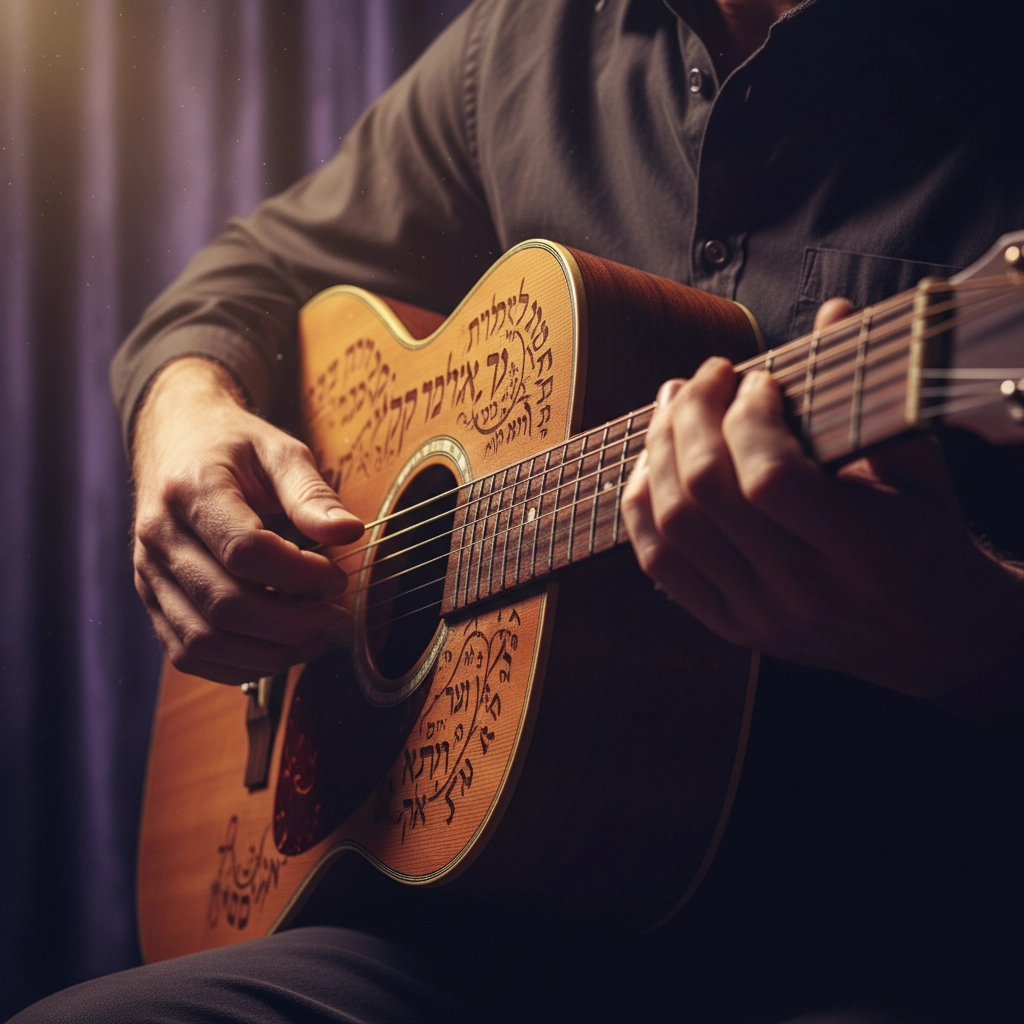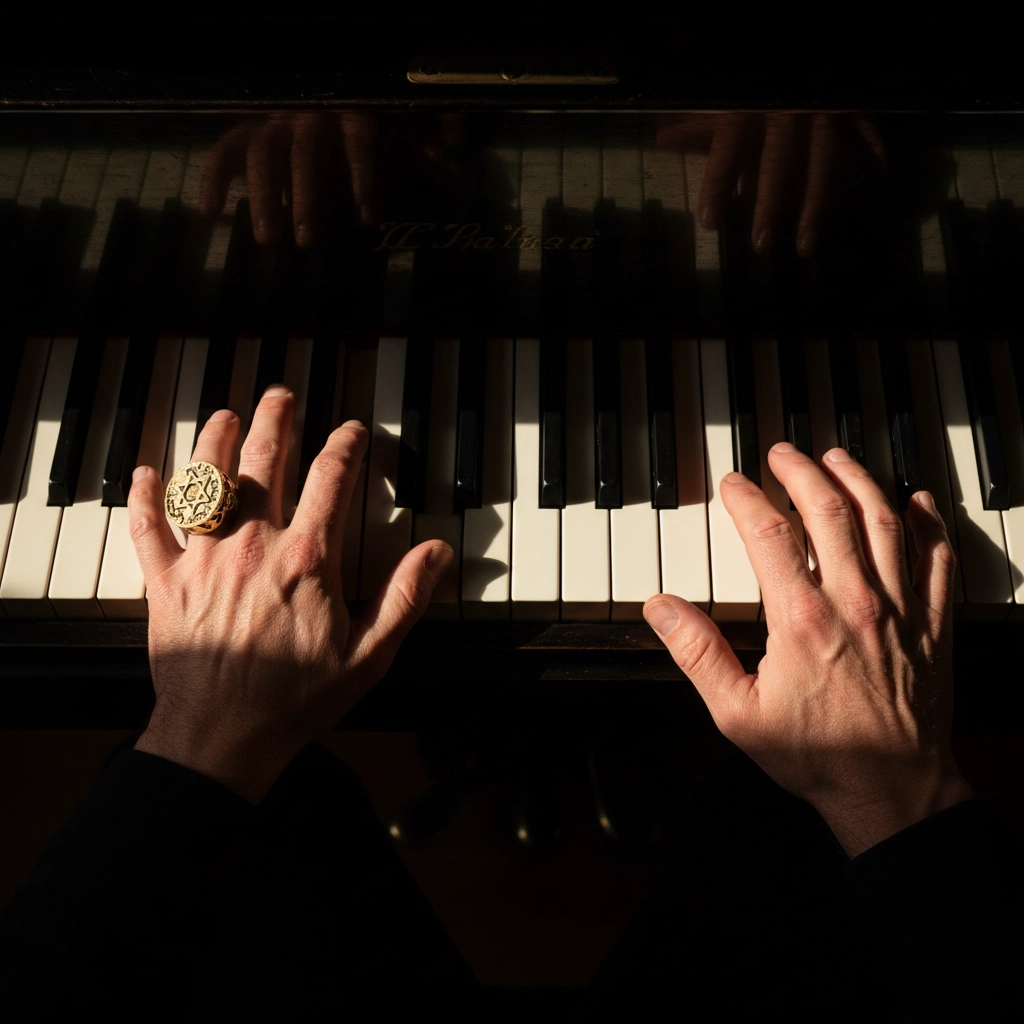
The Ultimate Guide to Finding Your Voice as a Jewish Artist
Let's be honest: finding your voice as a Jewish musician isn't just about hitting the right notes. It's about finding that sweet spot where your soul meets your sound, where tradition dances with innovation, and where you can be unapologetically yourself while honoring something much bigger than yourself.
I've been on this journey for years, blending country rock with Jewish themes, and I'll tell you what I wish someone had told me when I started: there's no single "right" way to be a Jewish musician. Your path is uniquely yours.
What Does "Finding Your Voice" Actually Mean?
Your voice isn't just the sound that comes out of your mouth: it's your entire artistic identity. It's how you interpret a niggun, the way you blend traditional melodies with modern arrangements, and how you connect with audiences on both a musical and spiritual level.
Some Jewish musicians find their calling in the synagogue as cantors, leading congregations in prayer. Others, like myself, create original music that weaves Jewish themes into contemporary genres. There are composers writing for Jewish choirs, educators teaching the next generation, and producers helping other Jewish artists bring their visions to life.
The key is understanding that your authentic voice comes from the intersection of who you are, where you come from, and what moves you musically.

The Spiritual Foundation
Before we dive into the practical stuff, let's talk about the spiritual side: because honestly, you can't separate Jewish music from Jewish values and tradition.
Jewish music has always been about more than entertainment. It's about connection: to G-d, to community, to our ancestors, and to each other. Whether you're performing traditional liturgy or writing original songs that explore Jewish themes, you're part of a musical tradition that goes back thousands of years.
This doesn't mean you have to be traditionally observant or stick to ancient melodies. It means understanding the deeper purpose behind Jewish music and how your work can contribute to that legacy. Some of my most meaningful songs came from grappling with what it means to be Jewish in today's world, blending my love for country rock with stories from my heritage.
Take time to explore different Jewish musical traditions. Listen to cantorial music, Hasidic niggunim, Israeli folk songs, klezmer, and contemporary Jewish artists. Understand the history and meaning behind different musical styles. This foundation will inform your work, even if your final sound is completely different.
Building Your Technical Skills
Okay, now for the practical stuff. You need to be good at what you do: really good.
Master Your Instrument
Whether you're primarily a vocalist, guitarist, pianist, or play other instruments, invest in proper training. This might mean formal lessons, online courses, or finding a mentor. Don't skip the fundamentals just because you're eager to perform.
If you're interested in cantorial work, you'll need serious vocal training plus knowledge of Hebrew, Jewish liturgy, and traditional melodies. Many cantorial tutors offer comprehensive training programs that cover everything from vocal technique to even vocal care so that you don't burn the candle at both ends and lose your voice.
Learn the Language
Hebrew is huge in Jewish music, obviously. But it's not just about proper pronunciation: understanding the meaning behind the words you're singing or setting to music adds depth to your performance. Take Hebrew classes, work with a tutor, or use apps like Duolingo to build your foundation. Alternatively, get yourself bilingual versions of the source material such as an English Siddur, Tehillim, Chumash, Mishnayos. Artscroll in addition to Chabad have put out some remarkable translation that really deep dive into what your reading with insightful commentary. This will add tremendous meaning afterwards when you try to sing the words.
Study Jewish History and Tradition
You don't need a PhD in Jewish studies, but understanding Jewish history, holidays, life cycle events, and different Jewish communities will make you a more informed and effective Jewish musician. This knowledge helps you choose appropriate music for different occasions and write more meaningful original material.
Finding Your Unique Sound
Here's where it gets fun: and where a lot of musicians get stuck. How do you honor tradition while creating something uniquely yours?
Experiment Fearlessly
Don't be afraid to blend genres. My own journey led me through about a dozen or two genres until I finally decided to combine country rock with Jewish themes, which isn't exactly traditional, to say the least, but it feels authentic to me. Maybe you're drawn to jazz, hip-hop, folk, electronic music, or something else entirely. The Jewish musical tradition is rich and diverse enough to accommodate any style.
Tell Your Story
Your personal experience as a Jewish person is unique. Maybe you grew up in a small town where you were one of the few Jewish kids. Maybe you struggled with your identity or found deep meaning in a particular tradition. These stories can become powerful songs that resonate with others who've had similar experiences.
Collaborate with Others
Working with other Jewish musicians, or musicians who understand and respect Jewish themes, can push your creative boundaries. You might find a writing partner who complements your strengths, or a producer who helps you achieve the sound you're hearing in your head.
Building Your Career
Let's talk business. Talent is essential, but it's not enough. You need strategy, persistence, and usually multiple income streams.
Start Where You Are
You don't need to wait until you're "ready" to start performing or sharing your music. Start with your local synagogue, Jewish community center, or Jewish organizations. Offer to perform at events, lead musical parts of services, or teach classes.
Build your repertoire gradually. Learn traditional songs that congregations or audiences expect, but also work on original material that showcases your unique voice.
Diversify Your Skills
Most successful Jewish musicians wear multiple hats. You might be a cantor who also does concert performances, a music teacher who writes original compositions, or a recording artist who also does session work for other musicians.
Consider developing skills in:
- Music education
- Audio production and recording
- Music therapy
- Event planning and coordination
- Music arranging and composition
Build Your Platform
In today's music industry, you need an online presence. Create professional social media accounts, build a website showcasing your music and services, and regularly share your work. Platforms like Spotify, Apple Music, and Bandcamp make it easier than ever to distribute your music independently.
Document your journey. Share behind-the-scenes content, talk about your creative process, and connect with your audience personally. People want to support artists they feel connected to.

Navigating Challenges
Being a Jewish musician comes with unique challenges. You might face questions about keeping kosher on tour, observing Shabbat while maintaining a performance schedule, or balancing secular and religious musical opportunities.
Set Your Boundaries
Decide what compromises you're willing to make and what lines you won't cross. Some musicians won't perform on Shabbat or holidays. Others are flexible about when they perform but particular about the content of their music. There's no right or wrong answer: just what works for you.
Find Your Community
Connect with other Jewish musicians who understand your journey. Join professional organizations like the American Conference of Cantors, attend Jewish music conferences, or participate in online communities. Having peers who get your unique challenges is invaluable.
Deal with Criticism Constructively
Some people might think your music is "too Jewish" for mainstream audiences or "not Jewish enough" for traditional venues. This kind of criticism comes with the territory. Focus on creating authentic work that feels true to you, and let your music find its audience.
Practical Next Steps
Ready to take action? Here's your roadmap:
-
Assess your current skills honestly. What do you do well? Where do you need improvement?
-
Set specific, achievable goals. Instead of "become a successful Jewish musician," try "write and record three original songs in the next six months."
-
Invest in your education. Whether it's vocal lessons, Hebrew classes, or music production courses, keep learning.
-
Start performing regularly. Even if it's just at open mic nights or small community events, get comfortable in front of audiences.
-
Document and share your work. Record demos, create videos, and build your online presence.
-
Network within the Jewish music community. Attend concerts, introduce yourself to other musicians, and build relationships.
Your voice matters. The Jewish music world needs what you have to offer: your unique perspective, your creative vision, and your authentic expression of Jewish life and values.
Whether you're just starting out or looking to take your existing music career in a more Jewish direction, remember that this journey is a marathon, not a sprint. Stay true to yourself, honor the tradition, and don't be afraid to push boundaries.
The stage is waiting for you. What story will you tell through your music?
If you want to hear how I've approached blending Jewish themes with country rock, check out my latest music and see how authenticity can create something truly unique.